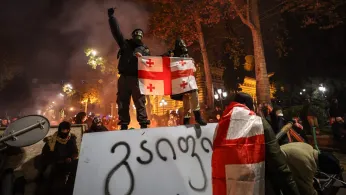
How Russia will remember the Tokyo Olympics

The 2021 Olympics was less of a sporting contest for Russia — more of a political bunfight. One poll before the Games showed 97 percent of Russians couldn’t name a single Russian athlete. Instead, the competition will be remembered for the naked homophobia on state-owned television, contentious refereeing in rhythmic gymnastics and the ‘We will ROC you’ campaign. But there was one positive: there were (almost) no doping scandals. Here are the key moments of Russia’s Olympics:
Drama at the rhythmic gymnastics
Perhaps the biggest disappointment of the Tokyo Games was the defeat of Russian rhythmic gymnasts Dina and Arina Averina. For the first time since 2000, Russia failed to win gold. World champion Dina Averina was beaten into second place by Israel’s Lina Ashram while her sister, Arina, came fourth.
Almost everyone had expected victory for the Averina sisters and their placings were controversial as Ashram dropped her ribbon during one performance — and still won gold. To add insult to injury, it’s possible this was Dina’s last Olympics: she is set to undergo surgery and may not return to top-flight competition.
Ashram’s victory was seen by many in Russia as not merely contentious — but proof of Russophobic political interference in sport. Russian media, especially state-owned media, went into overdrive with headlines including ‘Rhythmic swine’ (state-owned news agency RIA Novosti), ‘The Averinas – victims of politics’ (state-controlled Sport-Express), and ‘The judges gave outrageous scores to Ashram’ (state-owned Channel 1). On social media, popular opinion also favored political conspiracy. It was easier to believe in corrupt judging than the defeat of a Russian gymnast.
State propaganda turns on the LGBT community
Russian state-owned television was incensed by the performance of New Zealand’s transgender weightlifter Laurel Hubbard and openly gay British diver Tom Daley, leading to an outpouring of homophobia.
State Duma deputy Alexei Zhuravlyov described members of the LGBT community as “scum” and “homos” on a primetime show. “We are very tough on this vulgarity and perversion,” he said. And the host of another show, Anatoly Kuzichev, wore a wig with two pigtails, parodying Hubbard. He said transgender people were “psychopaths”.
Olympic champion figure skater Tatyana Navka, wife of presidential press spokesman Dmitry Peskov, also joined the fray. She posted a video of Spanish gymnast Cristofer Benitez on Instagram and commented: “I’m happy that in our country we don’t have this and I hope we never will … who can grow up in Western society with such tendencies?!”
After the shows were broadcast, the International Olympic Committee (IOC) demanded an explanation from the management of two state-owned channels. “There is no place for discrimination in the Olympic Games,” the IOC said in a statement. And there was also criticism of the homophobia by some prominent public figures, including well-known producer Alexander Rodnyansky, TV presenter and one-time presidential candidate Ksenia Sobchak, and actor Maxim Vitogran.
Advertising instead of the Ukrainian team
The political conflict between Russia and Ukraine also bubbled over into the Olympics. First, during the Opening Ceremony, state-owned Channel 1 failed to show the Ukrainian team. As soon as Uganda left the stadium, Channel 1 cut to a commercial break. Later, Ukrainian high jumper Yaroslava Mahuchikh ran into problems with top officials after she was photographed embracing her Russian opponent, Maria Lasitskene when they shared the podium — although there was little in the way of criticism on social media.
Almost doping-free
For the first time in many years, Russian contestants at a major sporting event managed to avoid a doping scandal. Almost. Barely had the Games finished when it emerged Russian triathlete Igor Polyansky had tested positive for a banned substance. However, since he placed 43rd in his event, it’s hard to imagine this will have major repercussions.
Throughout the Tokyo Games, Russian athletes competed under a neutral flag and without national symbols or a national anthem — part of the country’s punishment for previous doping violations. When a Russian won gold, the Russian anthem was replaced with an excerpt from Tchaikovsky’s Piano Concerto No. 1.
The restrictions led to Russia’s athletes launching a PR campaign – “We Will ROC You”, inspired by the Queen song where ‘rock’ is replaced with the abbreviation for ‘Russian Olympic Committee’. The effort was actively supported by officials: for example, Foreign Minister Sergei Lavrov wished Olympians luck using the phrase. As of Friday, there were more than 26,000 Instagram posts with the #wewillrocyou hashtag, while on TikTok clips with the same hashtag had almost 156 million views. The campaign was discussed by outlets including The New York Times, The Wall Street Journal, and The Guardian.
Why the world should care: Despite the fact that Russia’s athletes performed well (winning 20 golds and placing fifth in the medal table), the Tokyo Olympics will be more remembered for aggressive homophobia,and gymnastic failure. But the almost complete absence of doping suggests Russia is taking steps to resolve its problem — despite claims from politicians that all doping allegations are baseless.



